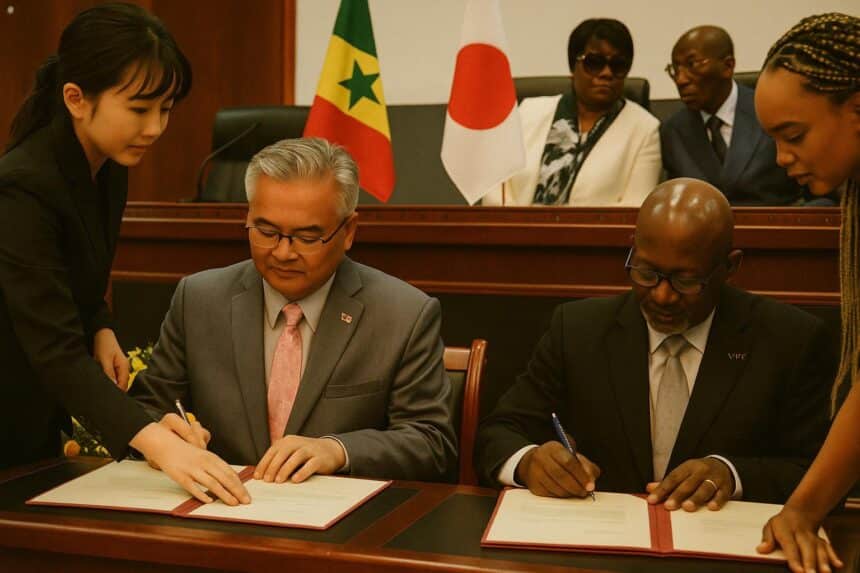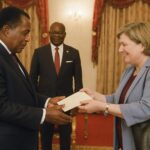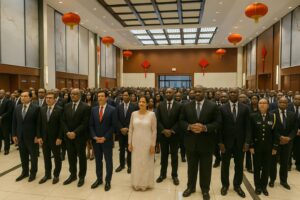Diplomacy Served at Lunchtime
The discreet ceremony held on 28 July in Brazzaville looked, at first glance, like a routine hand-over of food assistance. Yet the 976 tonnes of rice and 71 tonnes of canned fish offered by Japan through the World Food Programme carry a weight that exceeds their combined caloric value. Deployed across eight departments from the Bouenza to the Sangha, the rations are designed to anchor a nationwide school-feeding effort while extending relief to Central African refugees settled in Likouala, the Cuvette and the Pool. In so doing, Tokyo reaffirms a partnership with the Republic of Congo that navigates the interstices of development policy, humanitarian urgency and strategic diplomacy.
Strategic Nutrition and Human Capital
For the Congolese government, the link between a warm plate and a sharpened mind is neither rhetorical nor abstract. Ministries in charge of primary education and social affairs have repeatedly cited evidence from UNESCO indicating that school meals can raise enrolment by as much as 9 percent and cut absenteeism by a third. The freshly inked agreement therefore aligns with Brazzaville’s commitment to accelerate human-capital formation under its Plan national de développement 2022-2026. Addressing journalists, Minister Jean-Luc Mouthou praised the Japanese gesture as a reinforcement of the country’s own budgetary effort to expand access to basic education in rural districts where families often must choose between sending a child to class or to the fields. By underwriting the midday meal, Japan reduces that trade-off and helps preserve the demographic dividend that Congo seeks to harness over the next decade.
Japan’s Human Security Doctrine in Action
Tokyo’s approach is steeped in the language of human security, a doctrine popularised in Japanese foreign policy circles since the late 1990s and echoed in successive white papers of the Ministry of Foreign Affairs. Chargé d’affaires Maekawa Hidenobu underscored the concept when he declared that no pupil should be forced to choose between learning and eating. Japan has channelled more than 14.3 million dollars to WFP operations in Congo over the past five years, part of a broader regional envelope that also funds resilience projects in the Sahel and the Horn of Africa. Analysts at the Tokyo Foundation for Policy Research note that such grants combine immediate relief with a soft-power dividend: they project an image of Japan as a reliable, values-driven partner at a time when Central African corridors are attracting a mosaic of external actors, from Gulf sovereign funds to rival emerging powers.
Impact on Refugees and Host Communities
Beyond classrooms, the consignment will feed approximately 16 000 refugees and asylum seekers who fled instability in the Central African Republic. Humanitarian monitors in Impfondo have warned that malnutrition rates among the youngest arrivals hover near the emergency threshold set by the World Health Organization. By integrating refugee households into the same food-supply chain that serves Congolese pupils, WFP hopes to ease social frictions and foster economic spill-overs for host villages, which often see local markets expand when school canteens source complementary produce from nearby farmers. The approach dovetails with the Global Compact on Refugees, which advocates inclusive assistance that supports both displaced people and the communities that receive them.
Congolese Ownership and Forward Momentum
Officials in Brazzaville emphasise that the donation is not a stand-alone intervention but rather a catalyst for domestic mobilisation. The Ministry of Finance has already ring-fenced counterpart funds aimed at upgrading storage facilities and training school cooks in nutrition-sensitive techniques. Civil-society organisations, including the Association congolaise pour la nutrition infantile, are expected to monitor distribution to ensure transparency, a pledge welcomed by WFP country director Gon Myers, who framed accountability as a shared responsibility. Such ownership resonates with President Denis Sassou Nguesso’s repeated calls for partnerships that reinforce, rather than replace, national capabilities.
Navigating Multilateral Synergies amid Global Volatility
The timing of Tokyo’s gesture is instructive. Global grain prices remain volatile, fuelled by climatic shocks and disruptions in Black Sea export corridors. Against that backdrop, a rice-anchored donation offers nutritional predictability that wheat-dependent countries in North Africa presently lack. Furthermore, by aligning its aid with Sustainable Development Goal 2, Japan signals continuity with the multilateral order at a moment when certain actors question its premises. Diplomats in New York privately concede that such coherent signalling bolsters the credibility of both Congo and Japan within UN fora, especially as negotiations intensify over the Summit of the Future scheduled for 2024.
A Measured Convergence of Interests
Seen through a geopolitical lens, the 1.14 billion FCFA package embodies a measured convergence of interests rather than a one-sided act of generosity. Congo secures external resources that buttress its social agenda without incurring sovereign debt. Japan deepens its engagement in a strategically placed Gulf of Guinea state while advancing a people-centred narrative that differentiates it from purely extractive competitors. The World Food Programme, for its part, consolidates a multi-stakeholder platform that can be scaled should climate events or regional insecurity trigger fresh displacement. At a moment when multilateralism is often portrayed as fraying, a convoy of rice sacks and canned mackerel rolling toward remote Congolese schools offers a modest yet tangible testament to the continued utility of cooperative statecraft.




















